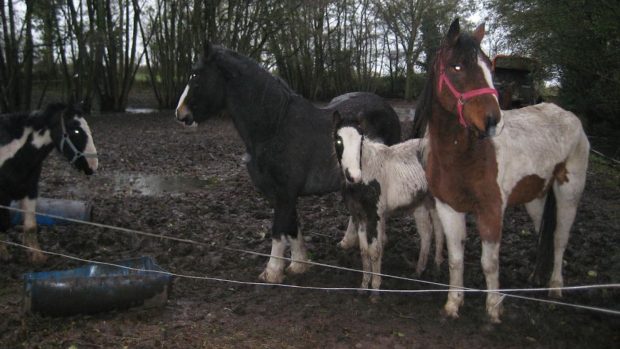A contraception programme has been launched in south Wales to combat the increasing number of horses and ponies on common land.
The Society for the Welfare of Horses and Ponies (SWHP) introduced the scheme in April due to welfare concerns.
Around 300 equines across an area of 12,000 acres from the Brecon Beacons and the Black Mountains to the South Wales Valleys have been given the contraceptive.
Fourteen dead ponies were found in one day in April 2013, following the heavy snow and freezing temperatures of the 2012/13 winter and earlier this year World
Horse Welfare’s Roly Owers described the situation as a “horse welfare time bomb”.
“Until the commoners take better control of their own breeding programme, more unwanted ponies will be bred,” he said.
The contraception programme will mean a “vast reduction” in the number of foals being born, according to SWHP.
“Being a small charity, we recognised we would stretch ourselves financially, but the time for talking has passed and there needs to be positive action taken,” Philip York of SWHP told H&H.
“For the first time, mares will be able to go into the winter without being in foal. The following winter they should fare even better with no foals at foot.”
The equines in the area include traditional Welsh mountain ponies, but also other breeds, from cobs to Shetlands, who have been released onto the land and have bred with the native ponies.
The charity believes if these animals continue to breed unchecked, their numbers of around 600 could double within three years.
The contraceptive vaccine works to stop the mares’ reproductive cycle and combats stallions’ desire to breed. It has been given to the semi-feral horses and ponies across several days using darts to minimise the stress caused to the animals.
Mr York hopes the programme, which has cost £5,500 to date, will be carried out across Wales thanks to the charity’s funding.
“SWHP is one of the only specialist semi-feral equine charities in the UK — we have it on our doorstep,” he said.
“This is a two to five year programme that will make a huge impact. We should see a substantial drop in numbers [of foals] born next year.”
Tony Tyler from World Horse Welfare added: “While we have not had any involvement with this particular project, we applaud any efforts to control breeding in these areas and wish the SWHP every success with the scheme.”
This is not the first time a contraception programme has been used on equines in the UK.
In March 2012, semi-feral Dartmoor hill pony mares were to receive a contraceptive injection with the aim of reducing the number of foals being left unsold and going to slaughter.
“We’re delighted with the way it’s going and everything we’ve achieved,” Charlotte Faulkner of the Dartmoor Hill Pony Association told H&H.
“The mares and stallions have stayed in their proper groups and when the stallions thinks the mares are pregnant he lets them spread out and graze more of an area.”
Of the 20 mares that have been included in the scheme for two years (starting Spring 2013) only one mare foaled this year.
The success of the contraception protection for the 74 new ponies included in the 2014 scheme will be known later this year.




